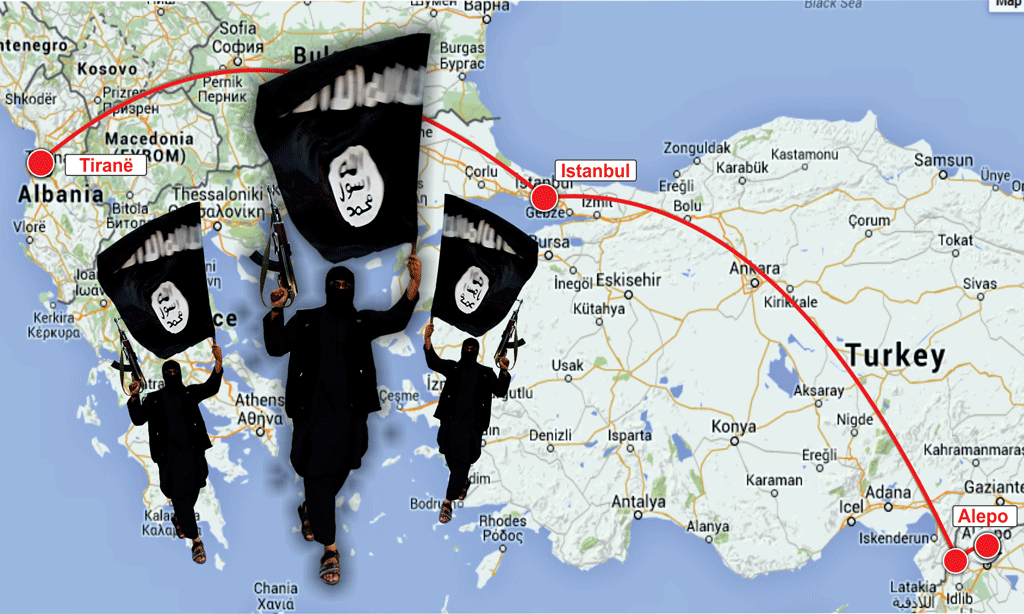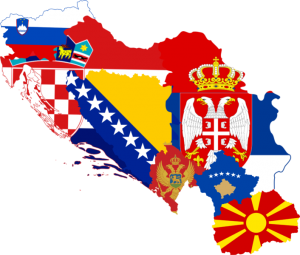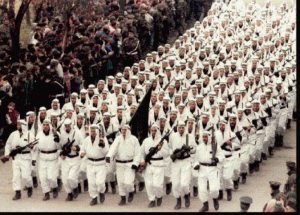
Views: 1250
In the recent decades, several groups of people in Bosnia, Kosovo, Serbia, Albania and Macedonia have appeared under the name “Salafi”. These religious activists, who practice completely different religious rules from the traditional ones of the Islamic religion, are distinguished from other believers by the characteristic way of praying (religious prayers), by their long beards, short mustaches and their characteristic clothes. These people do not claim to be “Wahhabis” but “Salafists” which means “ancestors”. They even oppose their appointment by others as “Wahhabis”, explaining that such a designation is made only by opponents of the Islamic religion, who want to cause division and discord among Muslim believers.
These religious activists, organized in different groups and funded by various Islamic organizations operating in Kosovo, North Macedonia and other countries in the region, have so far organized thousands of different religious courses and lectures in all territories inhabited by Muslim population in the region and continuously have misused not only various mortuary meetings, circumcisions and family holidays, but also public schools and universities as places for the development of agitation and their extremist religious propaganda.
The development of their destructive activities is done mainly tactically and according to a scenario that usually begins with the attack on traditional imams, accusing them of being uneducated or misguided. Then these activists proudly point to their “competence and mission” to spread a genuine Islam that is free of all Western influences. These religious extremists are proudly attacking their national identity according to their Islamist doctrine as if “for a Muslim it is not the national character that matters, but religion.” In propagating their anti-national theses, Islamist extremists emphasize their “truth”, bolster their truth until the nineteenth century when nations were created, all people were identified only by their religious affiliation, not by language, culture or any other ethnic characteristics.
According to this Islamist doctrine, the inspiration of Islamist extremists operating in Albanian lands to attack well-known national figures, such as Gjergj Kastrioti-Skanderbeg, Pjetër Bogdani, Idriz Seferi, and others, comes from accusing them of being the “murderers of Muslims”. Through the intensive development of religious agitation in the uneducated Albanian masses, Islamic extremists attempt to devalue prominent national figures and incite religious hatred against their legacy and persona. As a consequence of the influence of these propaganda statements, a number of shameful and vandalism acts were committed against the monuments of Skanderbeg, Mother Teresa, Pjetër Bogdani, Idriz Seferi, and others. In some cases, the urgent removal of “Catholic” monuments from the squares of Kosovo and Albania had been requested.
The development of Islamist propaganda and agitation is accompanied by fierce attacks against secularism and the rule of law, especially in Kosovo, Western Macedonia and Albania. According to these exponents, a just state can be built only if it is based on the religious rules of sharia. According to Islamist extremists, the cause of all problems in Kosovo, North Macedonia and Albania lies “in the leadership of the state by unbelievers” …, “in the non-practice of religious rules in public life” …, in allowing the construction of a Catholic cathedral in the Muslim land ”…,“ in the development of a pro-American and pro-European policy, which is generating harm and insults to all Muslim people”.
As a result, in all countries of the region, an intense anti-Western propaganda is being carried out, blaming the USA, the State of Israel and the EU member countries, for dividing the Muslim world in order to subdue, destroy it politically…, destroying its culture…, humiliation of Muslims as a people and as a religion. In this context, the Islamist radicals demand the unification of all Muslims in one state, according to the Qur’anic verses, that would affect the conquest and spread of the Islamic religion throughout the world.
In recent years, Islamist extremists in Kosovo have also been active in encouraging Kosovars to take part in the war in Syria and Iraq. Therefore, in July 2012, the Islamic Community of Kosovo ordered the holding of a sermon (weekly lecture held on Fridays) on all mosques of Kosovo. According to this circular, the 800 imams of Kosovo mosques gave a lecture dedicated to the “Land of Sham”. In this lecture the word of the Prophet Mohammed was propagated, according to which “Sham is a blessed land…, the chosen land of Allah…, the place where the believers stand stoically in respect to religion.”
Through this circular, deep hatred was expressed against the “Shiite” and “Alevi” sects and an appeal was made for the provision of “fraternal assistance to the Muslim people in Syria”. After this lecture, a new wave of Kosovar volunteers went to war in Syria. Even the son of the mufti of Kosovo, had made a public call to go to Syria “to liberate the holy land or to die for Allah”.
Therefore Islamist extremists through agitation and religious propaganda try to mislead young believers in every Muslim-populated countries in the Western Balkans that “the establishment of the Islamic Caliphate is envisaged in the Qur’an as the revival of the Islamic State” (which was established after the death of the Prophet Muhammad) …, “that Caliph Abu Bakr al-Baghdadi is the true descendant of the Prophet Muhammad”. As a result, in many Kosovar settings Caliph Abu Bakr al-Baghdadi is worshiped as an immortal religious and military leader not only of the Islamic State but also leads all Muslims in the world. Some indoctrinated individuals even refer to al-Baghdadi as Amir al-Mu’minin, or the “Commander of the Muslims,” whose mission is to continue the fight against the infidels.
According to an alleged al-Qaeda strategy, the fight against infidels began with the attacks of September 11th, 2001, it advanced worldwide, made headway with the proclamation of the Islamic State, and will end in 2020, with the complete victory of the “Islamic Army”. ”Against the unbelievers (Christians and Jews), where the eternal rule of the world will be established by Islam.
The development of such a propaganda by Islamist extremists for the “honor of Muslims”, for the “Islamic State”, for “jihad”, “paradise” and other concepts, along with the material assistance provided, is undoubtedly influencing some young people to create false hopes and misconceptions about life. Such an indoctrination also shows the worrying level of ideological degradation of parts of the Muslim youth, that has been achieved mainly through the systematic decline of the quality of education, high level of corruption, improper functioning of the state apparatus and the extremely negative impact of Islamic propaganda, which offers no rational idea or real concepts to solve various social, economic or political challenges, but only incites religious hatred and bigotry.
The profound economic crisis and political tensions that have reigned in the territory of former Yugoslavia during the last two decades of the previous century (XX century), and especially the circumstances of the war in Bosnia and Herzegovina and Kosovo, have influenced the creation of perceptions of social insecurity among all segments of society. These circumstances, characterized by the improper functioning of the state apparatus, the high level of corruption, the degradation of the public health system and the destruction of the education system, have enabled the unhindered activity of foreign extremist organizations in some countries of the Western Balkans. During this time, all countries in the region were gripped by crises and similar social, economic and political conflicts. In these circumstances, it was enough for a foreign extremist organization to settle in Bosnia, Albania or North Macedonia, and through ethnic ties and the common Islamic tradition that prevails in this compact geographical region, be able to extend its destructive force to other parts of the Western Balkans.
Thus a large number of Islamic humanitarian and non-governmental organizations from Saudi Arabia, the United Arab Emirates, State of Qatar, Kuwait and Turkey, later identified as terrorist financing organizations, have invested hundreds of millions of dollars to build a strong propaganda infrastructure, with the aim of spreading a radical ideology and inciting hatred and various religious conflicts in Bosnia, Kosovo, Albania and North Macedonia. These “charitable” organizations, through the material incentives and education of a whole generation of imams coming from the region and being immersed in the various fundamentalist Islamist schools of the Middle East, have created a suitable environment for the creation of an extremist Islamist movement in Kosovo and other countries of the region.
Islamist extremism in Kosovo and in other Balkan countries, in all its forms and shapes, poses a serious threat to national security. The degree of this danger is increased by the increasingly visible cooperation between various radical and extremist Islamic groups in the region, which is made possible by the motivation, the same religious ideology, and the common “jihadist” past. This danger has been concertized with the return of about 150 people from the war zones in Syria and Iraq and the operational acts of some foreign intelligence services in Kosovo, Albania, North Macedonia and other countries in the region. For this reason, the governments of the countries of the region, together with the international security institutions, in the interest of protecting human rights and their democratic order, should consider the fight against Islamic extremism as one of their primary duties. Currently, the risk of terrorist attacks by Islamic extremists from Kosovo and other countries in the region is possible and at the same time is limited. If political and social crises erupt in Kosovo, Albania and North Macedonia and the conflict in the Middle East deepens, causing the polarization of different views on Christianity and Islam, then the possibility of attacks committed by Islamist extremists in the region will not be ruled out; in Kosovo, Albania or any of the EU countries. In the interest of preventing possible Islamic terrorist attacks, a comprehensive program should be implemented to eradicate the radicalism of indoctrinated persons, especially those treated as “lone wolves”. Such a program should not be treated or understood as a “program for the de-Islamization of Muslims”, as propagated by some radical structures in Kosovo and other countries in the region, nor as a program that favors extremists in employment or recruitment comprising of “free” housing by the state, as demanded by some Muslim ideologues mainly in Kosovo.
The program of preventive measures for the eradication of radicalization should focus on finding and eliminating all those negative influences that have influenced the radicalization of many people in the countries of the Western Balkans. Only when the state authorities of the Balkan nations take the necessary measures to prevent the influence of various criminogenic factors, which are mainly of exogenous nature, can the eradication of radicalization and the abandonment of extremist misconceptions be achieved by hundreds of thousands of young people and Muslims in Kosovo and other Western Balkan Cities.
Originally published on 2021-02-11
About the author: Prof. Dr. Kolë Krasniqi was born on November 27th, 1961 in the municipality of Peć, Republic of Serbia. He completed primary school in his hometown and high school in Peć. In 1985 he graduated from the Faculty of Law of the University of Priština.
Source: Eurasia Review
Origins of images: Facebook, Twitter, Wikimedia, Wikipedia, Flickr, Google, Imageinjection, Public Domain & Pinterest.
Read our Disclaimer/Legal Statement!
Donate to Support Us
We would like to ask you to consider a small donation to help our team keep working. We accept no advertising and rely only on you, our readers, to keep us digging the truth on history, global politics, and international relations.











